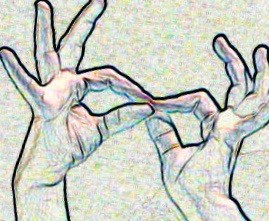
ASL for “interpreter”
I was fortunate not to be cursed to my face for being deaf or hearing-impaired. Still, I know I require more patience than usual from hearing people. I can’t help it, but because of my hearing loss, I am more aware of and dependent on body language. People may say the right words, but their body language will usually reveal true feelings.
Many years ago when I was young, I was confronted by a hearing person. The boy was a known trouble-maker, and he was looking for trouble. He swore at me, but I was unfazed by his speech. I could see from his body language he did not mean well. But, at that time I did not know any swear words and I stood there puzzled. He was not getting the expected reaction from me. When he found out I did not know, he thought it funny. Because of that, his anger was deflected from me, and I escaped to live another day.
Over the years my wife and I have been fortunate. Other deaf/Deaf have experienced far more rejection from the hearing world. Many of those who are part of the Deaf community do not think of themselves as being handicapped. Because they have their own language they can communicate among themselves using Sign Language.
Each country has its own version of a Deaf Sign Language. In the United States, the Deaf have American Sign Language. It is based on French Sign Language (FSL) from when the first Deaf teacher, named Laurent Clerc, was hired in 1817 by the Rev. Gallaudet to teach a Alice Cogswell. Clerc taught FSL to Alice and thirty other Deaf students in his first year. Over time this grew into American Sign Language (ASL).
The problem for Deaf is that there is no written form of ASL. Because it is based on FSL, it uses French language sentence structure and other elements of the French language. This makes it harder to translate from ASL to English. Many in the Deaf community are not fluent with written English. Without a good writing tool, learning and teaching is made more difficult and the education of Deaf suffers.
Because Deaf have Sign language, they feel fully functional as a distinct cultural group. They tend to think that the hearing majority needs to support them in translating between English and ASL. Indeed, in 1990 Congress passed ADA into law. ADA stands for Americans with Disabilities Act. Over time, this law expanded to include closed captioning and Sign Language Interpreters. Professionally trained interpreters in many, but not all situations, must be provided to assist the Deaf person in communicating with a hearing person. Unfortunately, one of the exceptions are churches. Churches may have a volunteer interpreter of variable skill, or pay for professional interpreters, but it is not required by ADA.
While I was working, I was able to request Closed Captioning (CC) for business meetings. I could communicate, one on one, with fellow employees, but group situations were near impossible for me without help. After I found out about the Deaf community and learned some Sign Language, I sometimes used an ASL Interpreter, but I preferred a Captionist. This support was not possible without the implementation of ADA law.
While I can’t speak for the blind, I do know of some who are both Deaf and Blind. They will use ASL Interpreters who are trained to sign using their hands in direct touch. Because they cannot see, they must sign with hands holding together.
With ADA law in place, the Deaf Community is able to communicate with hearing people. Interpreters provide the connection as a “go-between” the Hearing spoken language and Deaf signed language.
Despite these provisions by law, the Deaf Community do not experience a life style equal to the hearing. Why is that? Deaf tend to have lower paying jobs and less full-time work. Also, most hearing churches do not provide interpreters nor do they have any program for the Deaf. As a result, Deaf believers have to choose between a very few churches that provide support for Deaf believers, and spiritual support is minimal. As believers in Christ we, who are hearing, need to embrace our fellow Deaf believers without any discrimination, and to help them whenever possible.
For what possible reasons could deaf or blind of today suffer from those not deaf or blind? It was forbidden to be unkind, or make life difficult for deaf or blind people. God’s Word is clear, and the challenge is for today’s churches to reach out and support Deaf and/or Blind believers. What would Jesus do?
Leviticus 19:14 “You shall not curse the deaf or put a stumbling block before the blind, but you shall fear your God: I am the Lord.” (ESV)

Very interesting post. The church I am a member of has a person doing sign language on the second and fourth Sundays. For the visually impaired, our church does provide a large print hymnal and a large-print copy of the service folder I believe.
LikeLike